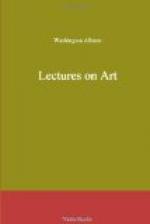Could any finite object account for this? But, supposing the Infinite, we have an adequate cause. If these emotions, then, from whatever object or circumstance, be to prompt the mind beyond its prescribed limits, whether carrying it back to the primitive past, the incomprehensible beginning, or sending it into the future, to the unknown end, the ever-present Idea of the mighty Author of all these mysteries must still be implied, though we think not of it. It is this Idea, or rather its influence, whether we be conscious of it or not, which we hold to be the source of every sublime emotion. To make our meaning plainer, we should say, that that which has the power of possessing the mind, to the exclusion, for the time, of all other thought, and which presents no comprehensible sense of a whole, though still impressing us with a full apprehension of such as a reality,—in other words, which cannot be circumscribed by the forms of the understanding while it strains them to the utmost,—that we should term a sublime object. But whether this effect be occasioned directly by the object itself, or be indirectly suggested by its relations to some other object, its unknown cause, it matters not; since the apparent power of calling forth the emotion, by whatever means, is, quoad ourselves, its sublime condition. Hence, if a minute insect, an ant, for instance, through its marvellous instinct, lift the mind of the amazed spectator to the still more inscrutable Creator, it must possess, as to him, the same power. This is, indeed, an extreme case, and may be objected to as depending on the individual mind; on a mind prepared by cultivation and previous reflection for the effect in question. But to




